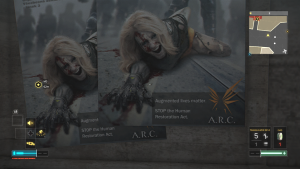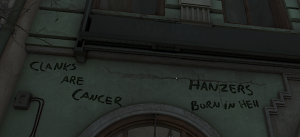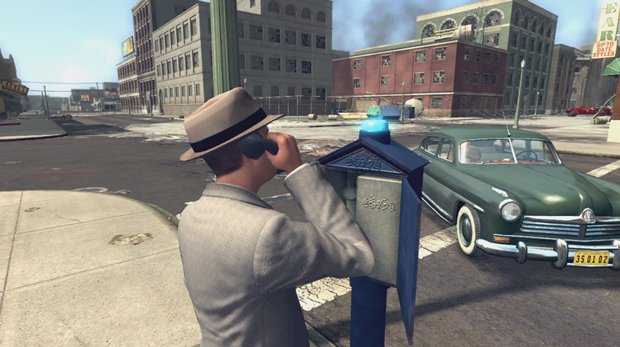I’ll be blunt: I didn’t want to play Deus Ex: Mankind Divided, but with the controversy around the game’s engagement with/appropriation of (depending on whom you ask) racial issues and activist movements, it’s an essential experience for someone looking for the human in the code. Mankind Divided promised humanity in their code, albeit an augmented humanity: mechanical apartheid, as they’ve framed it, in a world torn apart by human/augmented tension. Families are forcibly separated. The spectre of terrorism lurks unchecked. Deadly prejudice threatens the very fabric of humanity.
 Indeed, that plays out in the game. After its initial action-heavy sequence, Mankind Divided opens with the bombing of a train station, a risky move for a title already under fire for a so-claimed “coincidental” appropriation of BlackLivesMatter and the aforementioned mechanical apartheid. These entanglements with very real, very horrifying real-world issues could produce a game rife with emotional exploration of humanity’s most terrible tendencies, examinations of the different ideologies that drive policy and passion, the role of money and class in chaos.
Indeed, that plays out in the game. After its initial action-heavy sequence, Mankind Divided opens with the bombing of a train station, a risky move for a title already under fire for a so-claimed “coincidental” appropriation of BlackLivesMatter and the aforementioned mechanical apartheid. These entanglements with very real, very horrifying real-world issues could produce a game rife with emotional exploration of humanity’s most terrible tendencies, examinations of the different ideologies that drive policy and passion, the role of money and class in chaos.
Deus Ex: Mankind Divided wants to be that game. It is not that game. I’m not even sure what kind of game this is, really. Heavy cinematic? Action? Stealth? All of these? But certainly it’s broad, surface-skimming, somewhat empty of real engagement, reflective rather than refractive, but reflective of a shallow, predictable reading on tensions based in race and identity. That human/differently human tension guides everything, yet plays in the background. It’s all just a series of hoops for Adam Jensen. Help these people; break into this building; sneak past those guards. Standard game fare, but set against a backdrop rich with unrealized potential.
Mankind Divided creates a world that feels plenty real, building as it does on prior games in the series. History matters; so do politics and interrelations between regions and agencies. But even that provides mostly conversation fodder, and the sense of something bigger beyond the loops Adam runs chasing this goal or that. The aug/human tension is the center of everything, but also might not even exist at all; it could easily be replaced with any other problem. Adam could be Black, half-orc, a shunned criminal with his crimes tattooed across his face. It’s all the same. That’s part of the problem the problem with reducing real-world issues in-game to elves/augs/orcs/whatevers; this reduction strips the nuance from real problems, turning them into simple game obstacles. Worse, the Other in games being not-really-human only works to normalize the idea that the Other isn’t human, but something less. It’s easier then to justify them as targets, and for all Mankind Divided‘s work to humanize the persecuted augs, flattening issues of race/class/identity to this one easily-identified non-human feature obscures the very ideas the game wants to engage. The philosophical message of Mankind Divided is that things are complex, that prejudice is bad, that shuffling the Other off into a dank ghetto to be tortured is terrible; turns out maybe it’s the humans who are not being very humane. But these are things we know — they’re easy reads on tensions based in prejudice — and this particular game doesn’t seem to have much to offer in terms of expanding on those ideas.
When it comes in a futuristic and/or sci fi world, that issue is compounded, because futurist worlds so often assumes the post-racial. Augs are the marginalized group here because we have transcended race and found something else to hang our prejudice on; Adam (who, if it matters, is extraordinarily white, as though he’s never seen the sun) works with a diverse cast of characters, and in the background of the world, there’s a good deal of character diversity, even down to shifts in body type. Race doesn’t hold anyone back; relative general social position does. The underlying message is that conservative go-to: humans are hateful and prejudiced, full stop; race doesn’t matter. We’re all terrible. If we “solve” one problem, we’ll invent another.
 Sure, it’s easy to argue that we’re all terrible. But this approach is less interested in arguing for the horrors of humanity and more interested in arguing against centuries of racial violence, and at times, this particular approach feels a little like marginalization porn. Look! Suddenly the world is against the techies. Race doesn’t matter; it’s those who wanted to improve themselves, who wanted to merge with machines, the ones who wanted a better, stronger future. Now they’re the real victims! How the tables have turned. This is a whole new world: the aug/human tension isn’t just a racial tension, but rather a catchall for anything and everything. But this is just a series of decisions that serve to simplify a strata of prejudice around identity, race, class, religion, and everything else into a simple divide between who’s “pure” and who’s not. This simplification is troubling; it reminds me of a hundred conversations I’ve had, conversations in which rape culture is questioned because obviously rape is bad, rape is illegal, so how can we have a rape culture? Conversations in which the lack of an active organization like the Ku Klux Klan burning crosses in yards means racism is pretty much over, and talking about it is “playing victim” or “pulling the race card.”
Sure, it’s easy to argue that we’re all terrible. But this approach is less interested in arguing for the horrors of humanity and more interested in arguing against centuries of racial violence, and at times, this particular approach feels a little like marginalization porn. Look! Suddenly the world is against the techies. Race doesn’t matter; it’s those who wanted to improve themselves, who wanted to merge with machines, the ones who wanted a better, stronger future. Now they’re the real victims! How the tables have turned. This is a whole new world: the aug/human tension isn’t just a racial tension, but rather a catchall for anything and everything. But this is just a series of decisions that serve to simplify a strata of prejudice around identity, race, class, religion, and everything else into a simple divide between who’s “pure” and who’s not. This simplification is troubling; it reminds me of a hundred conversations I’ve had, conversations in which rape culture is questioned because obviously rape is bad, rape is illegal, so how can we have a rape culture? Conversations in which the lack of an active organization like the Ku Klux Klan burning crosses in yards means racism is pretty much over, and talking about it is “playing victim” or “pulling the race card.”
These complex human issues can’t be boiled down to racist/not-racist, rape/not-rape, or violent/not-violent. I wish they could. It would make confronting problems head on a lot easier. But the open acts of racism happen less frequently (or did, perhaps, before the rise of Trump), and rape isn’t always being dragged into a car by a complete stranger bent on sexually violating anyone available in a demonstration of power.
But though I came into Deus Ex: Mankind Divided with fire and determination, now that I’m halfway through the game I’m just bored. Mostly, I walk around. I talk to people, and talk, and talk, and because I can see the dialogue options before I choose, which Adam then repeats, the conversations feel eternal. They’re not terrible conversations, just long, often surface and predictable, because there are only so many ways this story can unfold, and I have only a handful of choices that separate me from being a total asshole or a nicer guy (I tend to choose the latter). It’s pretty, mostly, though I’m too aware of the game space, the loading times, the weird rag doll configurations of bodies I drag from rooms, though there rarely seems to be a chance they’ll be found and so far, no one’s woken up after being knocked out. They drift and tumble as I pull. Nothing about it feels real. Not even the dark complex Golem City, where augs are stashed away, imprisoned and brutalized with impunity, feels particularly affecting. Riots? The spark of revolution? Nah, that doesn’t impact me. I have someone’s mundane e-mail to read.
How can I care about the fate of the augs when everything feels so distant? I rifle through a car’s trunk right in front of a police officer. Is she too bored to care? Is this a statement on her ennui, on the fatalistic attitudes of post-incident Prague? Or could it be she’s the proof that the system isn’t quite so set against augs after all? It seems unlikely; I am an aug, and the city has done its damndest to prove to me exactly what that means. It’s easy to throw me in jail. No one cares about me. She turns away and studies the ground. I steal ammo, money. I climb onto a van and jump into a ventilation shaft on the back of a government building. No one cares. And so I don’t care. There’s nothing at stake. Maybe I could ratchet up the difficulty and suddenly hiding would be harder, but why would I? I’m not building any relationships with anyone, and I know how this will end: the good guys won’t be completely good, and the bad guys not completely bad. See? It’s complex after all!
Maybe I’m not being fair. But at the end of the day, Deus Ex: Mankind Divided feels like little more than a walking simulator to me, an endless loop around a Prague that is beautiful until the fifth time I have to criss-cross the same areas, and I realize how dead it all is, how little changes, how static everything looks, with the same people in the same places, repeating the same gestures. I sneak into buildings. I peer through grates. I spend a lot of time not engaging, and that’s a choice — you could probably smash through this like an avenging augmented angel if you wanted, but that’s not how I roll — and so, sure, there’s more to it. There’s the personalization of augmentations in support of play style, and there’s decision-making about how and where and when to take on the game’s challenges. But mostly I walk, and I talk, and I read e-mail and e-books, and why isn’t there a pumpkin spice latte around to just really cap things off?
Deus Ex: Mankind Revolution yearns to be a big game about big concepts, but you can’t write about big concepts in broad strokes if you want to get anywhere beyond tropes and basic observations. That’s as clear a tension as anything between the augs and humans, and as much as I’d like to dig a little more deeply into it, I expect nothing more than a big ending action sequence, some serious hacking, perhaps a race against time, a bit of a trolley-problem style decision. I expect standard game scenarios, and so every time I load a save, I can’t help but think: so much fuss over this? Just this? Is that all there is?



